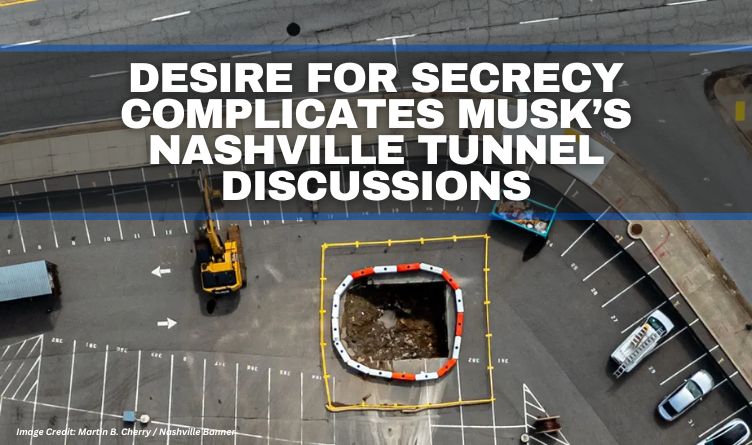Boring Company responds to Nashville mayor’s questions, claims project is ‘weatherproof’.
Image: The Boring Company construction site near the Tennessee State Capitol on Rosa Parks Blvd. Image Credit: Martin B. Cherry / Nashville Banner
**Note from The Tennessee Conservative – This article posted here for informational purposes only.
This story was originally published by the Nashville Banner. Sign up for their newsletter.
by Stephen Elliott, [The Nashville Banner, Creative Commons] –
Elon Musk’s The Boring Company has provided Mayor Freddie O’Connell 18 pages’ worth of responses to the city’s questions about plans to dig a tunnel from downtown to Nashville International Airport.
But a back-and-forth between the parties in recent days highlights the complications of dealing with a boundary-pushing startup protective of its trade secrets while complying with public records laws.
Late last week, after Metro received a response marked “proprietary and confidential” from The Boring Company, two Metro officials responded to ask what, specifically, was “proprietary and confidential.”
“We see that it contains a confidentiality notice indicating that the document contains either ‘trade secrets or other proprietary data,’” Clifton Peay, director of performance management in the mayor’s office, wrote in an email provided to the Banner via public records request. “From our initial review of the document, we have not been able to identify anything that would constitute either a trade secret or proprietary data.”
In a letter the following day, Metro associate legal director Lora Fox wrote that the Department of Law “has been unable to find an exception to the Tennessee Public Records Act for records of this type.”
“The information does not appear, based on our limited knowledge of your field, to rise to the level of a trade secret or proprietary data. And, as noted in the Response itself, some of the information has already been shared with the public.”
The letter asked The Boring Company to seek a protective order from a judge within a week, or the city would release the documents under the public records act.
Much of the information included in the responses was published on the company’s website, prompting further frustration from Metro Legal.
“I am writing to express Metro’s considerable frustration with TBC marking the response document as confidential when it was sent to us and then apparently releasing it to the press without even letting us know,” Fox wrote to TBC legal counsel Ashley Steinberg on Monday. “We wanted to release the document on Friday, but were honoring the NDA and your designation as confidential, in order to allow you a short period in which to seek a protective order. … We would appreciate [it if] you would let your client know that the Tennessee Public Records Act is a significant law in Tennessee that Metro must honor. Please do not mark documents as confidential unless there are clear legal grounds for doing so. It is not consistent with the collaborative process that TBC says it is pursuing.”
Through a representative, The Boring Company has not yet responded to a request for comment.
The nondisclosure agreement referenced in Fox’s email was signed by Peay on Aug. 7, about a week after the company and Gov. Bill Lee announced the tunnel plan. That agreement required some tweaks, according to communications released to the Banner. Feinberg acknowledged in early August “that our standard NDA must be adjusted given the TN Open Records Act.” The NDA includes a carveout for “information that must be disclosed pursuant to the Tennessee Public Records Act.” The governor’s office told the Banner it has not signed any NDA related to the project.

Fox told the Banner that it is unusual for the city to enter into NDAs. Some economic development negotiations are considered exempt from the public records act, and there are various other government documents that are not subject to release.
“We rarely sign nondisclosure agreements,” Fox said. “The only times when it seems reasonable to do so is when you’re dealing with an entity that might have proprietary information or other information that is not subject to the public records act.”
She said that an NDA cannot supersede state open records laws.
“We’re never agreeing to not share public information,” Fox said. “The most we’re ever doing is agreeing to consult with them so they can explain or get a court order so that we can know whether or not something really is a public record.”
The July announcement of the Boring Company’s plan to build the tunnel to the airport drew both cheers and jeers. The state quickly greenlit a no-cost lease for a Capitol-area parking lot, where TBC has begun excavation work. The governor’s office confirmed to the Banner last month that it did not have any environmental studies, community impact studies or other vetting of the project.
Lee’s office, according to records obtained by the Nashville Business Journal and other outlets, believed that O’Connell’s office sought to distance itself from the project due to Musk’s then-close ties to President Trump. Lee thanked O’Connell for his collaboration at the project announcement, though it appears that Metro had limited communication with The Boring Company prior to the announcement.
The Boring Company has promised that the tunnel project, which could eventually extend to other locations around the city, will be entirely privately financed, with rider fares recouping the construction costs. In the answers provided to Metro, TBC acknowledged that “the long-term ownership structure of the tunnel is under review and will be publicly released once finalized.”
Users would be driven in Teslas (another Musk company). One of the main questions from the mayor’s offices centered around safety and access for first responders. The company said it has been meeting with state and local fire officials and would “conduct weekly emergency response drills with first responders.”
Another key concern is flooding. The company stated that the Music City Loop tunnels would be “watertight” and that the company’s smaller project in Las Vegas “is almost exclusively submerged and operates almost below the water table without issue.” The stations would be elevated and equipped with barriers or drains to keep water from running into the tunnels, the company continued. The project is “a weatherproof system designed to withstand natural events,” according to the company.
Jim Fitzgerald, vice president of business development for TBC, wrote on Sept. 8 to reiterate his invitation to Nashville Fire Department and mayor’s office representatives to tour the tunnel in Las Vegas, as well as a “standing offer for an in-person, productive discussion with the appropriate offices from the City of Nashville.”



